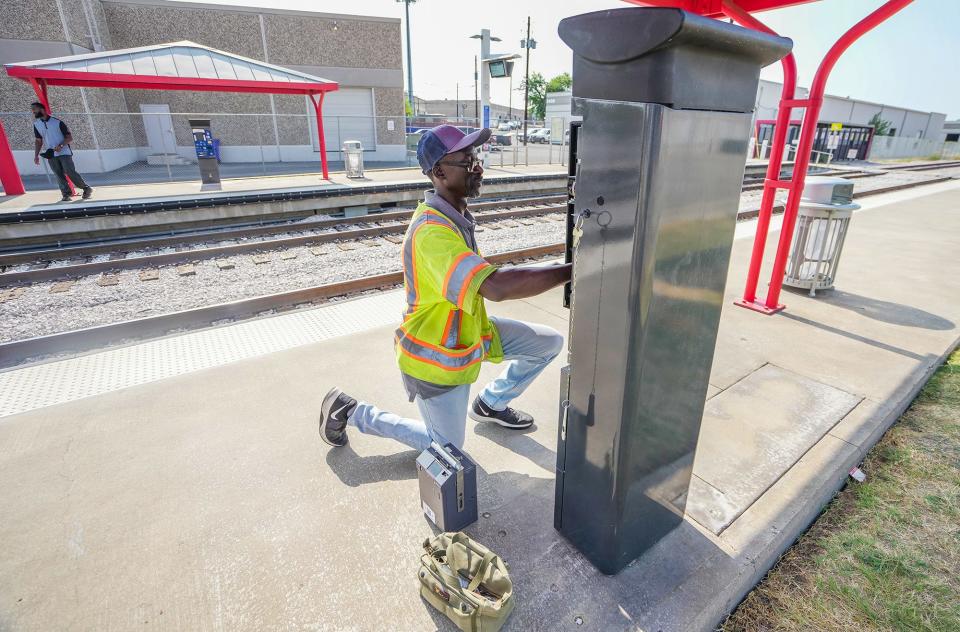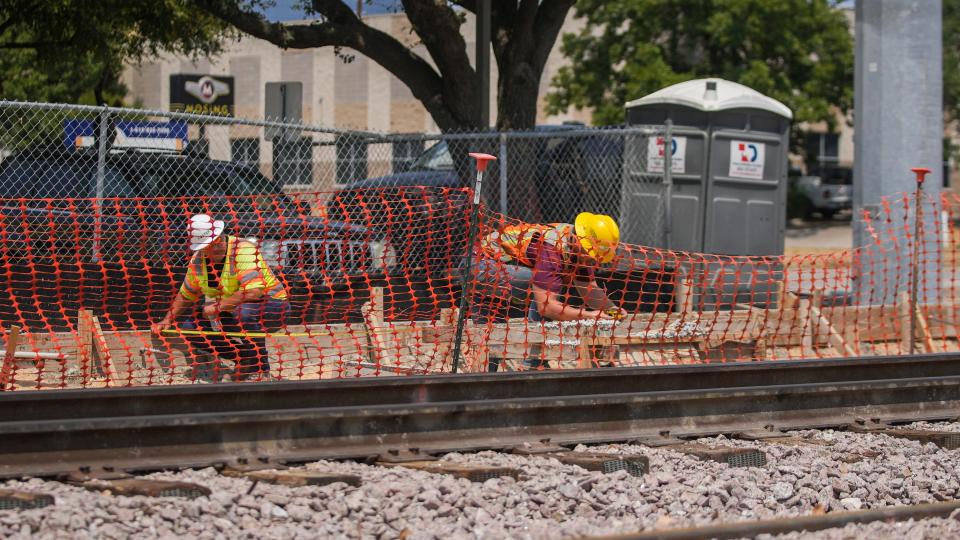Austin city leaders sued over changes to Project Connect's light rail plans, finance model
City of Austin leaders misled voters on a $7.1 billion public transportation investment and accompanying property tax increase in 2020, according to a lawsuit filed this week by critics of the voter-approved project. The legal challenge requests a halt to the collection of property tax funding for the project — a move that could put the project's future in jeopardy.
The lawsuit centers on various elements of Project Connect, a multi-billion dollar project — one of the largest ever ballot initiatives considered in the city's history — expected to transform the city's transit map with a new light-rail system, additional high-frequency bus routes, improvements to the Austin-area's existing commuter rail offerings and other transportation infrastructure improvements.
The 33-page lawsuit was filed Monday in Travis County district court. It largely centers on the centerpiece of the project: the light-rail system, plans for which have undergone a number of changes since 2020. Construction of the system is expected to span in the 2030s.
It's not the first challenge the project has encountered, as Project Connect and its finance model faced challenges from lawmakers in the Texas Legislature earlier this year. A bill aimed at effectively killing the concept fell short of passage due to a procedural move with less than a week to go in the session, though critics and supporters later forecast possible future challenges to elements of the project.
Supporters of Project Connect cast the challenges, including the recent lawsuit, as attempts to subvert the will of Austin voters and undo efforts by local elected officials to expand transportation options.
To fund the project, voters were asked to approve raising the ad valorem property tax rate by 8.75 cents to help pay for the project, including costs associated with the maintenance and operations of the system. The change represented a nearly 20% increase to the city's ad valorem property tax rate.
In 2020, voters approved the measure by a more than 15 percentage-point margin.
Opponents say the funding mechanism outlined for the project is ill-conceived and questioned whether light rail is a cost-effective method of public transit for Austin. The lawsuit aims to prevent the city from collecting property taxes for Project Connect and block the issuance of bonds without voter approval — a novel financial mechanism at the heart of the legislative challenges and a Texas Attorney General Office opinion earlier this year.
Plaintiffs for the lawsuit, which names all members of the Austin City Council and Austin Transit Partnership board of directors, include restaurant Dirty Martin's Place; Gonzalo Barrientos, a former Democratic state senator; Ora Houston, a former city council member; Margaret Gomez, current Democratic Travis County commissioner; and Susana Almanza, a founding director of social justice organization PODER.
Austin attorneys Bill Aleshire, a former Travis County judge and tax assessor/collector, and Rick Fine are representing the plaintiffs. Aleshire declined to comment Tuesday, saying the plaintiffs would hold a news conference at 2 p.m. Wednesday at Dirty Martin's to speak publicly about the lawsuit.
Casey Burack, an executive overseeing business and legal affairs for the Austin Transit Partnership, an entity created after the 2020 vote to deliver the light rail system, declined to comment on the details of the lawsuit. In a statement to the American-Statesman, she wrote: "Austin Transit Partnership is not commenting on the pending litigation and continues to advance the project."

Supporters of Project Connect decry lawsuit
Proponents of Project Connect say the lawsuit aims to derail what would be a transformational project for Austin, juicing the city's public transit options and improving affordability and mobility while decreasing air emissions and traffic.
"People overwhelmingly supported it. They continue to overwhelmingly support it," Bill McCamley, the executive director of Transit Forward, an advocacy group set up to support Project Connect, told the Statesman. He characterized the lawsuit as an attempt to undermine what Austin voters approved in 2020. "We strongly encourage the city, CapMetro and (Austin Transit Partnership) to keep the ship on course."
The shrinking and segmenting of the initial light rail buildout were informed by a six-week public engagement process, which garnered input from thousands of Austin residents on five route alternatives. McCamley said the Austin Transit Partnership faced tough decisions and knew rises in real estate, labor and supply chain costs were complicating infrastructure projects across the country, sometimes resulting in significant scalebacks.
"This is what responsible governing looks like," McCamley said in a statement.
McCamley did not comment on the specifics of the lawsuit, saying he had not yet reviewed it.
Lawsuit claims city lacks 'voter permission' after changes to light rail proposal
Ahead of the 2020 vote, the centerpiece of Project Connect — the light rail proposal — was projected to cost $5.8 billion, making up the majority of the budgeted $7.1 billion. Those costs would cover construction for 28 miles of light rail line, including a connection to Austin-Bergstrom International Airport and an underground subway system in downtown Austin with shopping and live music venues.
Those cost estimates grew — in what officials attributed to inflation pressures that drove up costs for materials and labor — by an additional $4.5 billion in the two years afterward, putting the estimated price tag at about $11.6 billion. In July 2022, citing the cost increase, local transportation officials outlined a plan for the initial buildout, later settling on downsizing to a nearly 10-mile line and breaking up the project in phases.
The reduced plan is expected to cost between $4.5 billion and $4.8 billion. This summer, the boards of directors for CapMetro and Austin Transit Partnership and the Austin City Council approved the plan.
The "drastically diminished" plan has diverted greatly from what voters were shown ahead of the November 2020 election to a degree that the city "no longer has voter permission" to continue collecting the previously approved property tax increase, according to the lawsuit.
"The truth is, the 2020 Project Connect Bait was never feasible or legal," the lawsuit reads.
Also at issue are additions incorporated into the plans after voters approved the funding for the project in 2020, according to the lawsuit, including the proposed route through 3rd Street, the new Trinity Street bridge crossing Lady Bird Lake and the establishment of a bus and rail maintenance yard near East Austin neighborhoods.

This article originally appeared on Austin American-Statesman: Austin's $7.1B Project Connect faces legal challenge

